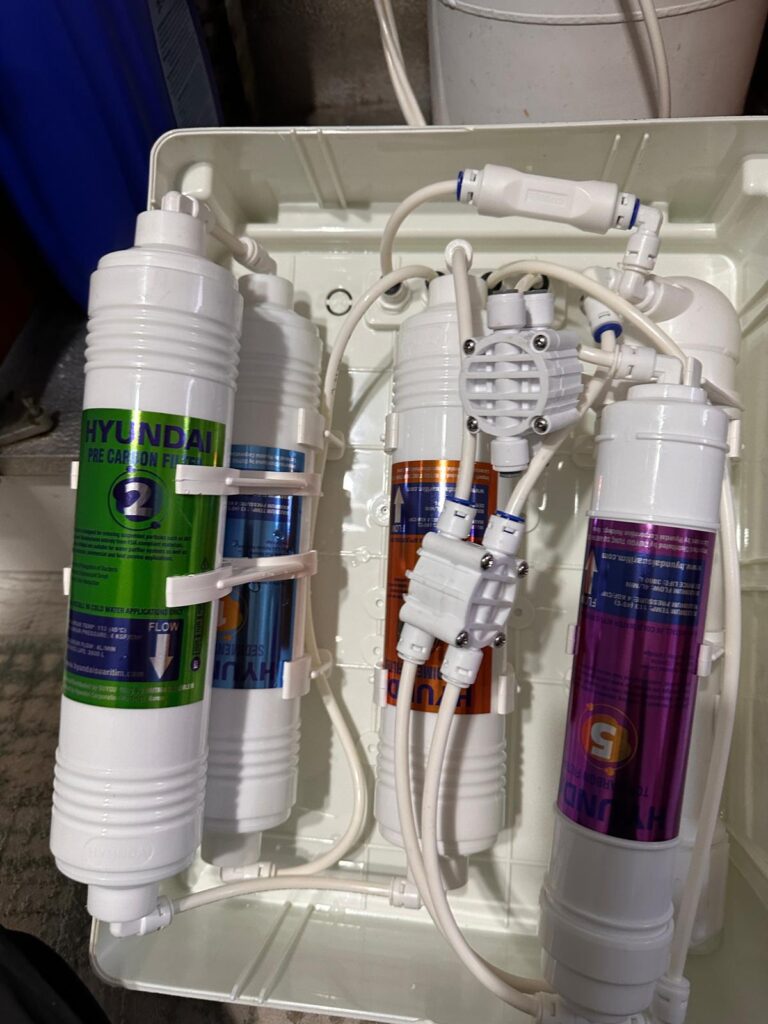Su Arıtma Cihazı Filtre Değişimi
Bursa’da Su Arıtma Cihazlarının Önemi Sağlıklı ve temiz içme suyu, her bireyin temel ihtiyacıdır. Bursa’da musluk suyunun doğrudan içme suyu olarak kullanımı pek tercih edilmez. Bunun nedeni, şehrin farklı bölgelerinde suyun sertlik derecesi ve içeriğinin değişiklik göstermesidir. Özellikle Osmangazi, Nilüfer, Yıldırım, Mudanya ve Kestel gibi bölgelerde suyun kalitesi değişkenlik gösterebilir. Bu nedenle, Bursa su arıtma cihazı kullanımı, sağlıklı ve kaliteli su tüketimi açısından büyük bir önem taşır. Su arıtma cihazları, musluk suyunu arındırarak sağlıklı içme suyu elde edilmesini sağlar ve hem evlerde hem de iş yerlerinde güvenle kullanılabilir. Ayrıca, su arıtma cihazı fiyatları Bursa için araştırılan önemli konular arasındadır. Biz, her bütçeye uygun fiyat seçenekleri sunarak herkesin sağlıklı içme suyuna ulaşmasını sağlıyoruz. Bursa’da Su Arıtma Cihazı Seçerken Nelere Dikkat Edilmeli? Bursa’da su arıtma cihazı alırken dikkat edilmesi gereken bazı önemli faktörler şunlardır: Bu kriterlere dikkat ederek, Bursa’da en iyi su arıtma cihazı seçimini yapabilir ve kaliteli suya ulaşabilirsiniz. Su Arıtma Cihazı Fiyatları Bursa’da Ne Kadar? Bursa’da su arıtma cihazı fiyatları, tercih edilen modelin özelliklerine ve kullanılan filtreleme sistemine bağlı olarak değişkenlik gösterir. Genel olarak fiyatları belirleyen faktörler şunlardır: Her bütçeye uygun su arıtma cihazı alternatifleri sunarak, kaliteli içme suyuna ulaşmanızı sağlıyoruz. Su Arıtma Filtresi ve Düzenli Değişimin Önemi Su arıtma cihazlarının etkili çalışabilmesi için düzenli bakım ve filtre değişimi büyük önem taşır. Zamanla filtreler, musluk suyundaki tortu, klor, ağır metaller ve diğer zararlı maddeler nedeniyle tıkanabilir. Bu durum, cihazın performansını düşürerek suyun kalitesini olumsuz etkileyebilir. Filtre Değişimi Neden Gereklidir? Bursa su arıtma filtre değişimi hizmetimiz sayesinde cihazlarınızı en iyi performansta kullanabilir ve her zaman temiz suya ulaşabilirsiniz. Bursa’da Su Arıtma Cihazı Bakımı ve Teknik Servis Bursa’da su arıtma cihazları için sadece satış değil, aynı zamanda bakım, montaj ve teknik servis hizmetleri de sunuyoruz. Cihazınızın ömrünü uzatmak ve maksimum verim almanızı sağlamak için düzenli bakım yapılması gerekmektedir. Teknik Servis Hizmetlerimiz: ✅ Filtre değişimi – Tüm marka ve modeller için orijinal filtre değişim hizmeti sunuyoruz.✅ Cihaz bakımı – Su arıtma cihazlarınızın periyodik bakımını yaparak su kalitenizi artırıyoruz.✅ Onarım ve tamir – Arızalanan cihazlarınızı uzman teknik ekibimizle hızlı bir şekilde onarıyoruz.✅ Montaj ve kurulum – Yeni satın aldığınız su arıtma cihazlarını profesyonelce kuruyoruz. Bursa’da su arıtma cihazı kullanan müşterilerimize, hızlı ve güvenilir teknik servis desteği sağlıyoruz. Bursa Su Arıtma Firmaları Arasında Neden Biz? Bursa’da birçok su arıtma firması bulunmasına rağmen, bizi tercih etmeniz için birçok sebep var: Ortimax, LG, Hidrotek, Conax, İhlas, Sumosu, Oksijen, Hyundai, Buzsu gibi Türkiye’nin önde gelen su arıtma markaları için bakım, onarım ve montaj hizmeti sunuyoruz. Bursa’daki en iyi su arıtma hizmetini almak için bize güvenebilirsiniz! Bursa’da Hangi Bölgelere Su Arıtma Hizmeti Sunuyoruz? Bursa genelinde su arıtma cihazı ve filtre değişimi hizmeti sunarak, herkesin sağlıklı içme suyuna ulaşmasını sağlıyoruz. Özellikle şu bölgelerde yoğun olarak hizmet veriyoruz: Ayrıca, Türkiye genelindeki müşterilerimiz için online sipariş ve kargo hizmeti ile en kaliteli su arıtma cihazlarını ve yedek filtreleri güvenle temin edebilirsiniz. Su Arıtma Cihazı ve Filtresi Aramalarında Öne Çıkıyoruz Bursa su arıtma firmaları arasında lider konumda olma yolunda ilerliyoruz. Müşteri ihtiyaçlarına yönelik özel çözümler sunarak, en çok tercih edilen hizmetlerimiz şunlar: Sağlıklı su tüketiminin öneminin farkındayız ve sizlere en iyi su arıtma çözümlerini sunmak için sürekli kendimizi geliştiriyoruz. Hemen Bizimle İletişime Geçin! Bursa’da su arıtma cihazı ve filtre değişimi konusunda güvenilir bir adres arıyorsanız, doğru yerdesiniz! Sağlıklı ve temiz içme suyu için hemen bizimle iletişime geçin:📞 Telefon: [Telefon Numaranız]📩 E-posta: [E-posta Adresiniz]🌐 Web Sitesi: [Web Siteniz] Su kalitenizi artırmak ve aileniz için en iyi içme suyunu sağlamak için uzman ekibimizle hizmetinizdeyiz! Sıkça Sorulan Sorular (SSS) 1. Su arıtma cihazı ne kadar sürede bir bakım gerektirir?Genellikle 6 ayda bir filtre değişimi, yılda bir kez genel bakım yapılması önerilir. 2. Bursa’da su arıtma filtresi değişimi hizmetiniz var mı?Evet, tüm markalar için orijinal filtre değişimi ve bakım hizmeti sunuyoruz. 3. Su arıtma cihazları musluk suyunu tamamen temizler mi?Evet, ters osmoz teknolojisi sayesinde ağır metaller, klor, bakteri ve diğer zararlı maddeler filtrelenerek temiz içme suyu sağlanır. 4. Su arıtma cihazı fiyatları neden farklılık gösteriyor?Cihazın kapasitesi, filtre teknolojisi ve marka özellikleri fiyatları belirleyen faktörler arasındadır. 5. Teknik servis ve montaj hizmetiniz hangi bölgelerde geçerli?Bursa’nın tüm ilçelerinde servisimiz mevcuttur. Online siparişler için ise Türkiye genelinde kargo ile destek sağlıyoruz.

